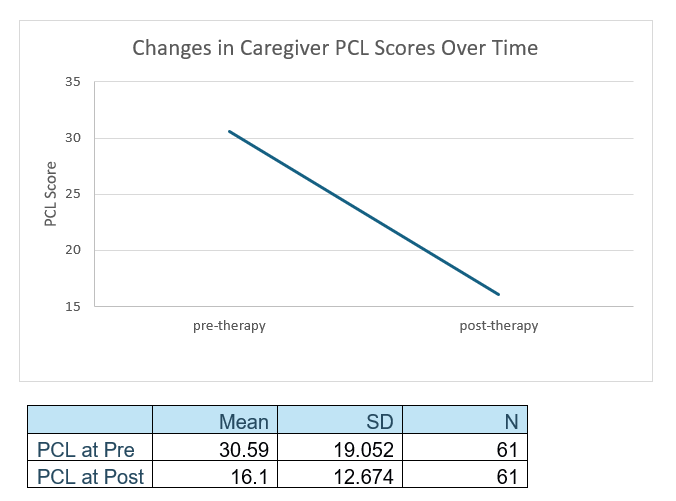The Child and Family Traumatic Stress Intervention (CFTSI) we use in Project CONTACT utilizes repeated assessment throughout the course of treatment to monitor family’s progress. Additionally, we use other metrics at the beginning and end of therapy to measure the overall impact of participating in treatment. Previously, we have documented the gains children make in resiliency and self-efficacy, as well as the reductions they demonstrate in trauma symptomatology.
This month, we highlight the benefits that caregivers obtain from participating in CFTSI. Both at the beginning and end of treatment, caregivers complete the PTSD Checklist for DSM-5 (PCL-5), a 20-item self-report measure used to assess the severity of PTSD symptoms in adults. It is a tool that can help identify individuals who may have PTSD and can also be used to monitor progress during treatment.
Our data demonstrate that caregivers show a highly significant reduction in their trauma symptoms after participating in therapy, F(1,60) = 39.65, p<.001. Please see the graphic below for details.

Follow-up analyses are also quite encouraging. The results are ones in which no significance is actually good news. When examining whether various factors influence the reductions in trauma symptomatology caregivers demonstrate in response to participating in CFTSI, we found that none of the following factors were significant:
- Caregiver’s ratings of child trauma symptoms
- Children’s ratings of their own trauma symptoms
- Caregiver’s ratings of child resiliency
- Children’s ratings of their own resiliency
- Children’s ratings of their own self-efficacy
- Family SES
- Race
Consequently, we can conclude that regardless of a family’s demographics or overall level of trauma symptoms, caregivers experience significant relief for their own trauma symptoms when participating in CFTSI.

